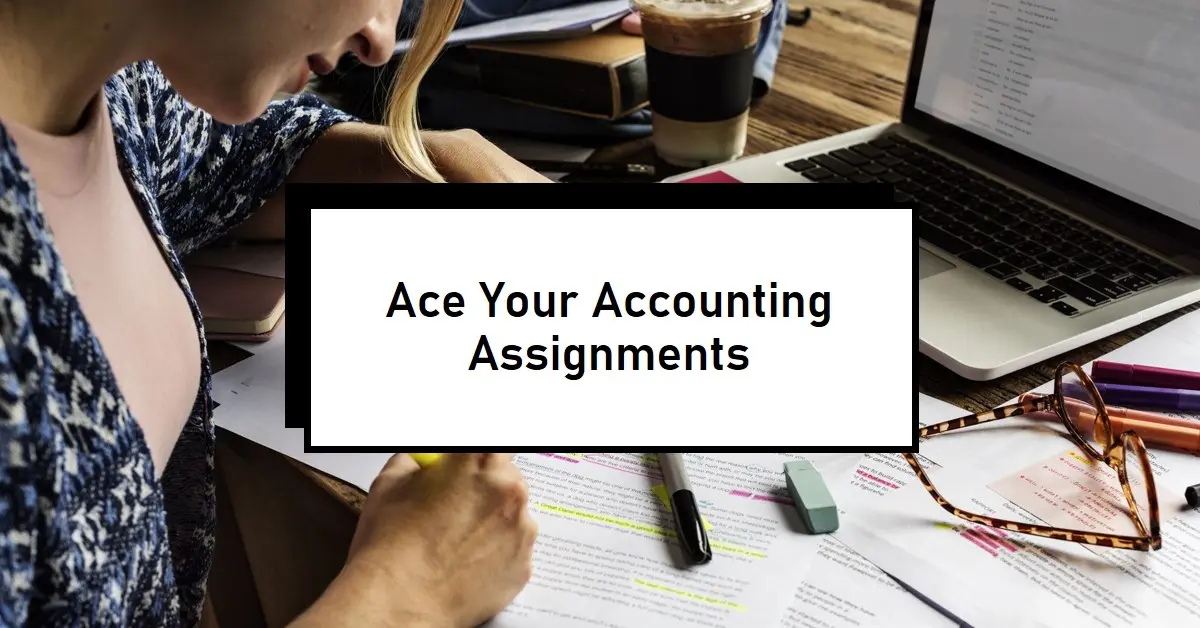Accounting presents a formidable challenge to students due to its intricate theories, complex calculations, and meticulous financial statements. Yet, proficiency in accounting is indispensable for those aiming at careers in finance, business, or related domains. To facilitate effective navigation of accounting assignments, several key techniques prove invaluable. First, establishing a solid grasp of foundational concepts such as the accounting equation and financial statements lays a crucial groundwork. Organizing study spaces conducive to concentration and equipped with necessary resources enhances productivity. Breaking down assignments into manageable segments and utilizing real-world examples for practical application fosters deeper understanding. Leveraging technology for calculations and accessing online educational tools further supplements learning. Collaboration through study groups and seeking timely assistance from Accounting Assignment Help services when needed also contribute significantly. By adopting these strategies, students can bolster their comprehension and proficiency in accounting, ensuring readiness for future professional endeavors in 2024 and beyond.
Understand the Basics Thoroughly
Before tackling complex accounting problems, it is essential to establish a strong grasp of basic principles. Fundamental concepts such as the accounting equation, double-entry bookkeeping, and financial statements (including balance sheets, income statements, and cash flow statements) form the bedrock of accounting knowledge. Understanding these basics not only provides a framework for more advanced topics but also enhances problem-solving abilities. The accounting equation, for instance, encapsulates the fundamental relationship between assets, liabilities, and equity, serving as a cornerstone for financial analysis. Double-entry bookkeeping ensures accuracy by recording every financial transaction in two corresponding accounts, thereby maintaining the balance of accounts. Meanwhile, familiarity with financial statements enables interpretation of an organization’s financial health and performance. By mastering these foundational elements, students can confidently navigate complex accounting tasks and build a robust understanding that supports their academic and professional growth.
Organize Your Study Space
Creating an effective study environment is crucial for maximizing productivity. Start by ensuring your study space is free from distractions, such as noise or clutter. Having all necessary materials within reach—textbooks, notebooks, calculators, and a computer—will minimize interruptions and streamline your workflow. Keep your workspace organized so that notes and reference materials are easily accessible. This organization not only saves time but also enhances focus during study sessions. Consider personalizing your space with motivating elements like inspirational quotes or plants to create a conducive atmosphere for learning. By maintaining a tidy and well-equipped study area, you set yourself up for success, making it easier to concentrate on mastering challenging accounting concepts and completing assignments efficiently.
Break Down the Assignment
Breaking down large assignments into smaller, manageable tasks is a vital strategy for tackling overwhelming workloads effectively. Begin by thoroughly reading through the entire assignment to grasp its requirements and scope. This initial step allows you to identify key components and prioritize your approach. Next, develop a detailed step-by-step plan that outlines clear milestones for each section or task. By setting achievable goals and timelines, you not only reduce the daunting nature of the assignment but also ensure comprehensive coverage of all necessary aspects. This structured approach enhances clarity and organization, making it easier to maintain focus and track progress throughout the assignment process. Moreover, breaking down tasks facilitates better time management and minimizes the risk of overlooking important details. Ultimately, adopting this methodical approach empowers you to approach large assignments with confidence and systematically achieve successful outcomes.
Use Real-World Examples
Applying theoretical knowledge to real-world scenarios is crucial for enhancing understanding and retention of accounting concepts. By seeking examples in financial news, business case studies, or even your personal finances, you can contextualize what you learn in the classroom. This practical application bridges the gap between theory and practice, making it easier to grasp complex ideas and see their relevance in actual financial scenarios. For instance, analyzing a company’s financial statements from news reports can illustrate how accounting principles are applied in a dynamic business environment. Similarly, managing personal finances using basic accounting principles can reinforce concepts like budgeting, cash flow management, and financial reporting. Overall, integrating real-world examples into your study approach not only deepens your comprehension of accounting theory but also prepares you to apply these skills effectively in future professional endeavors.
Leverage Technology
As we step into 2024, the landscape of accounting education is enriched with an array of software tools and applications designed to enhance learning. Microsoft Excel remains indispensable for its robust capabilities in data analysis and financial modeling, while QuickBooks simplifies complex accounting tasks such as bookkeeping and payroll management. Online calculators further streamline calculations, ensuring accuracy and efficiency in financial computations.
Moreover, educational platforms have evolved to offer interactive tutorials and practice problems tailored to reinforce accounting concepts. These resources provide immersive learning experiences, allowing students to apply theoretical knowledge to practical scenarios effectively. Whether through simulations of real-world financial transactions or virtual labs for auditing practices, these tools empower learners to develop critical skills essential for their careers in accounting and finance. Embracing these technological advancements not only enriches learning but also prepares students to navigate the complexities of modern accounting practices with confidence and proficiency.
Seek Help When Needed
When faced with challenges in completing accounting assignments, even with diligent effort, Accounting Assignment Help services offer invaluable support. These services provide expert assistance that clarifies complex concepts and ensures assignments are completed accurately and on schedule. Seeking help from these resources not only aids in understanding difficult topics but also maintains momentum in your studies, preventing delays or misunderstandings that could impact your overall comprehension of the subject. Embracing such assistance fosters a proactive approach to learning, enabling you to navigate through challenging assignments with confidence. Moreover, it allows you to focus on mastering fundamental principles and enhancing your problem-solving skills, essential for a successful academic journey in accounting. By utilizing Accounting Assignment Help services effectively, you can effectively manage your workload, improve your academic performance, and stay motivated in your pursuit of accounting proficiency.
Join Study Groups
Collaborating with classmates through study groups offers invaluable benefits for tackling challenging accounting problems. These groups provide a platform to engage in meaningful discussions, where diverse perspectives and insights can shed new light on complex topics. By pooling together resources and sharing knowledge, students can collectively enhance their understanding and grasp of difficult concepts. Moreover, the collaborative environment fosters motivation and accountability, as members encourage each other to stay focused and on track with assignments and study goals. This peer support system not only strengthens individual learning but also builds teamwork skills essential for future professional endeavors in accounting and related fields. In essence, study groups serve as dynamic spaces where learning becomes interactive, collaborative, and ultimately more effective in mastering the intricacies of accounting studies.
Practice Regularly
Accounting proficiency hinges on consistent practice. Allocating dedicated time each week to tackle practice problems and revisit previous assignments is crucial for reinforcing understanding and honing problem-solving skills. Through regular practice, students not only familiarize themselves with accounting principles but also develop the ability to apply theoretical knowledge to practical scenarios effectively. This iterative process enhances their confidence in handling complex calculations and analyzing financial data with precision. Moreover, revisiting past assignments allows students to identify areas for improvement and track their progress over time. By integrating regular practice into their study routine, students cultivate a deep-seated comprehension of accounting concepts that transcends mere memorization, preparing them comprehensively for academic challenges and future professional endeavors in the dynamic field of accounting.
Utilize Online Resources
For accounting students, navigating online resources can significantly enhance learning experiences. Websites such as Khan Academy and Coursera provide a plethora of tutorials, practice exercises, and articles covering diverse accounting topics. These platforms offer structured courses designed by experts, allowing students to deepen their understanding at their own pace. Furthermore, various accounting blogs serve as valuable supplements, offering practical insights and real-world applications.
Engaging with forums and social media groups further enriches the learning process by fostering a collaborative environment. Here, students can pose questions, discuss challenging concepts, and benefit from the expertise of peers and professionals alike. These interactive platforms not only provide academic support but also encourage networking and career development within the accounting community. By harnessing these resources effectively, students can broaden their knowledge base, refine their skills, and stay abreast of industry trends, ensuring they are well-prepared for success in their accounting studies and future careers.
Review and Revise
Before submitting your accounting assignment, thorough review and revision are crucial steps to ensure accuracy and completeness. Start by meticulously checking for calculation errors to maintain precision in financial reporting. Verify that all financial statements, including balance sheets and income statements, are meticulously balanced and reflect accurate figures. Ensure that all required components of the assignment, such as explanations of methodologies or analyses, are included and clearly articulated.
This final review process serves as a critical safeguard against oversight and enhances the overall quality of your work. By dedicating time to this meticulous examination, you not only rectify any potential errors but also demonstrate attention to detail and adherence to accounting standards. Ultimately, these efforts contribute to a polished and professional submission that showcases your comprehension of the subject matter and commitment to academic excellence in accounting.
Stay Updated with Accounting Standards
Accounting standards and regulations can change frequently. Staying updated with these changes is crucial for accuracy in your assignments. Regularly check authoritative sources like the Financial Accounting Standards Board (FASB) or the International Financial Reporting Standards (IFRS) for the latest updates.
By implementing these techniques, you can enhance your understanding of accounting and improve your performance in assignments. Remember, consistency and a proactive approach to learning are key. And whenever you find yourself needing a bit of extra support, don’t hesitate to use Accounting Assignment Help services to guide you through challenging topics. With these strategies, you’ll be well-equipped to tackle any accounting assignment that comes your way.
Conclusion
In conclusion, mastering accounting assignments requires a blend of fundamental understanding, practical application, and effective study techniques. By solidifying your grasp of basic principles, organizing your study environment, breaking down tasks, and leveraging technology and real-world examples, you can navigate complex accounting problems with greater confidence and efficiency.
Additionally, embracing collaborative learning through study groups and utilizing online resources ensures you have access to diverse perspectives and comprehensive support. Regular practice, coupled with continuous review and revision, not only enhances your problem-solving skills but also reinforces your understanding of accounting concepts.
Lastly, when facing challenges that seem insurmountable, remember that seeking help, including from Accounting Assignment Help services, is a proactive step towards overcoming obstacles and achieving academic success. By adopting these strategies and maintaining a proactive approach to learning, you’ll be well-prepared to excel in your accounting studies and beyond in 2024 and beyond.



